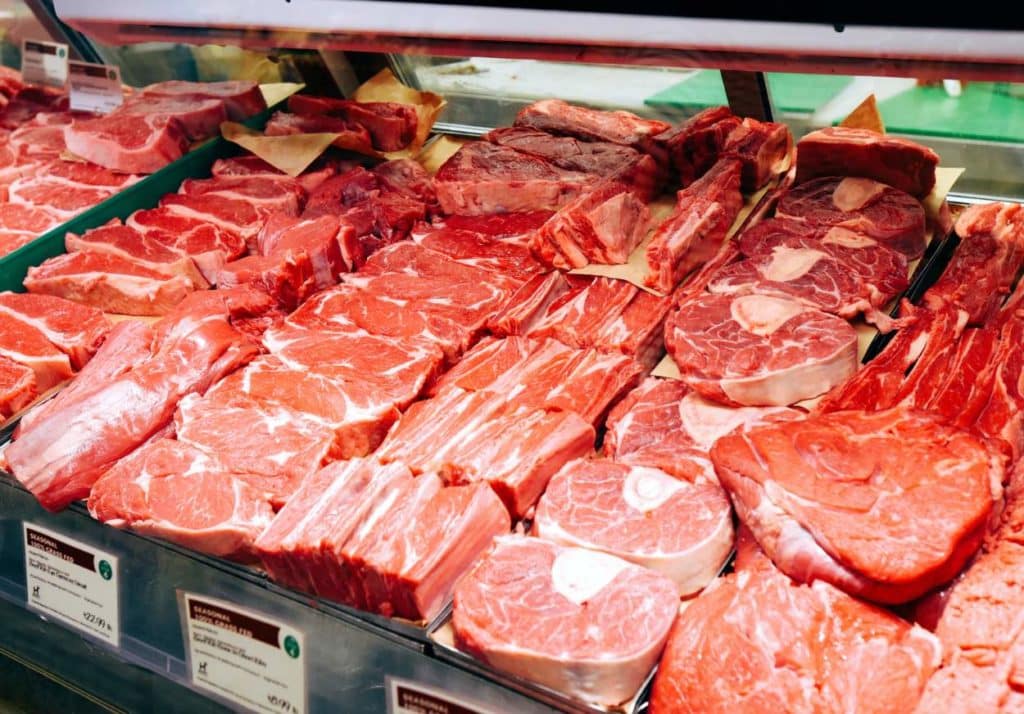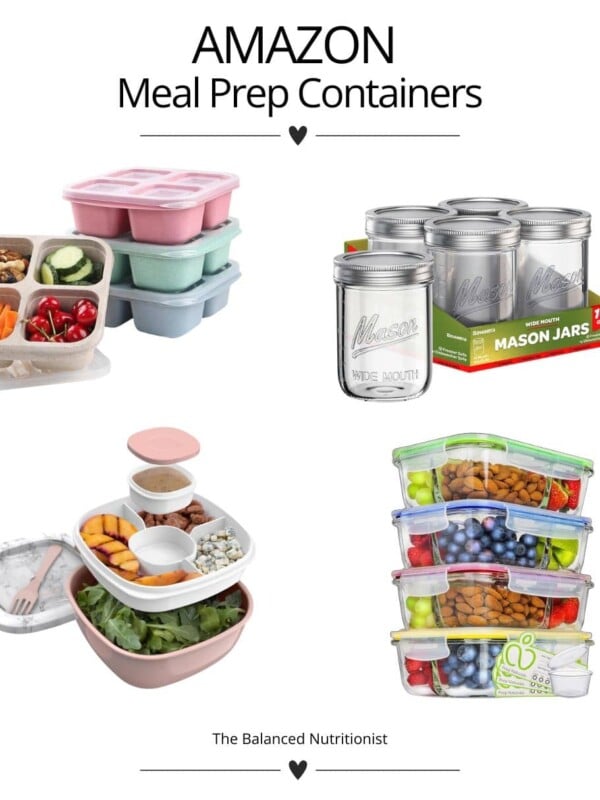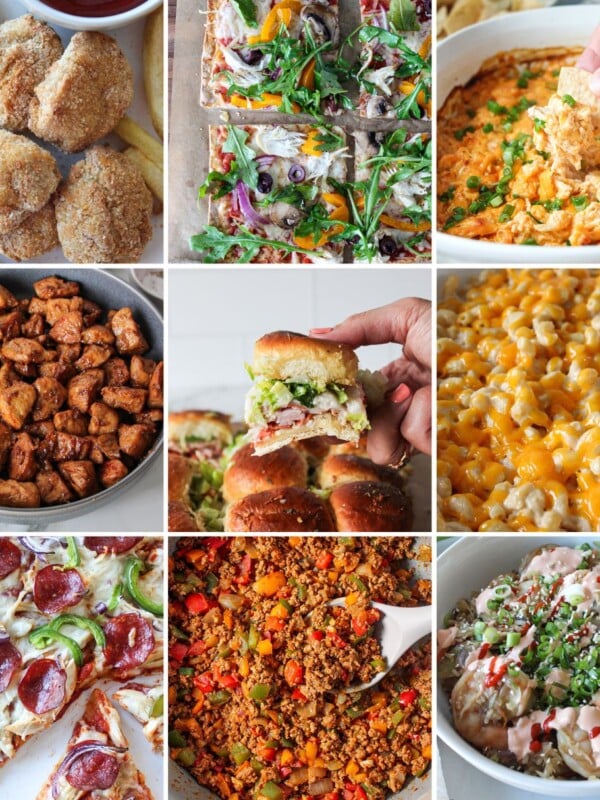This post may contain affiliate links. Please read our disclosure policy.
Protein is an important element of everyone’s diet, but there are a lot of misconceptions floating around about this macronutrient.
Let’s clear the confusion and sort out some facts about protein! We’re going to talk about why you need it, animal vs plant-based sources, and how much you actually need.
Hi, I’m Jamie, a Registered Dietitian of 8+ years. In a world full of fad diets and misinformation, eating can feel so confusing. My passion is helping women escape the never-ending diet cycle and find their balance with food.

What is protein?
Protein is one of three macronutrients: proteins, carbohydrates, and fats. We need the three macronutrients to provide our body with calories – aka energy – as well as to be the building blocks for making things in our body, like muscles, red blood cells, and hormones.
Protein is made up of little building blocks, called amino acids. There are twenty different kinds of amino acids. Our bodies can make eleven of these amino acids on their own, but we need to get the other nine through the food we eat, so those nine are called “essential” (1).
Fortunately, as long as you eat enough food and have a reasonable variety of foods, it’s not super difficult to get enough protein (even if you’re a vegetarian).
Why do we need protein?
We need protein to build new cells in our bodies. This is how we grow more muscle, skin, bone, and hair cells, to name a few.
Protein is also responsible for speeding up chemical reactions in your body, like digesting food and moving oxygen through your blood. Without it, your body couldn’t do what it’s supposed to!
You might think protein is only important for your muscles, but it’s an essential nutrient for good health in general.
When is it best to eat protein?
Best practice is to eat protein-rich foods throughout the course of the day. Just like cramming for a big test, trying to hit your protein goal at the very end of the day won’t do you much good.
There’s conflicting evidence about how much dietary protein your body can actually process in one sitting, but most experts agree it’s best to spread out your intake throughout the day (4).
Spreading your protein consistently throughout the day also plays a key role in keeping cravings at bay because it keeps you satisfied (more on that coming next!).
9 Facts about protein
Alright, so we know what it is and why we need it, but there’s still a lot to learn (and a ton of myths to bust). Here are some interesting protein facts that you may not know…
Fact 1: Protein helps you feel full
This one’s my favorite protein fact. Protein is the most satiating macronutrient when compared to carbohydrates and fats. Studies have shown when you eat protein, your body releases hormones that make you feel full.
People who eat high-protein diets tend to eat less overall, compared to low-protein diets (2). That’s the power of protein!
Fact 2: You might need more (or less) than you think
Protein requirements can vary based on weight, sex, muscle mass, activity level, and even health status (like if you’re sick or injured). The average sedentary person needs a minimum of 0.8g per kilogram of body weight every single day (3).
But what does that look like in real life? You can check if you’re eating enough protein on a daily basis with this simple equation:
Take your body weight (in pounds) and divide by 2.2. This gives you your weight in kilograms. Next, multiply your weight in kilograms by 0.8. This gives you your minimum protein needs.
Example: 150-pound person
150 pounds/2.2 = 68kg
68kg x 0.8 = 54g of protein
Let’s look at what that 150-pound sedentary person needs to meet that 54g protein goal. These three foods alone (included in a full meal) could easily meet their protein needs:
- Breakfast: 2 scrambled eggs (16 grams of protein)
- Lunch: Ham sandwich (17 grams of protein)
- Dinner: ½ of a boneless, skinless chicken breast (27 grams of protein)
Total Protein: 60 grams
Keep in mind, this is a minimum! Most people do end up needing more than this, especially if you’re more active (or even just working on it).
For example, active people who exercise regularly need closer to 1-1.5g/kg of protein. If you’re training for an event or you regularly do a lot of strength training, you likely need more like 1.2-1.7g/kg of protein.
Fact 3: You can get protein from animal or plant sources
A big juicy steak might come to mind when you think of protein, but you can actually get protein from many sources. From cheese to chickpeas, there’s a way to meet your goal. Here are 10 animal-based and plant-based sources to get you started!

Animal-based protein sources
Remember those 9 essential amino acids we talked about? You won’t miss out on any of them if you eat meat, dairy, and eggs. The proteins from animal sources are complete proteins, meaning they have all 9 amino acids (6). And, some animal products also offer more vitamin B12 and iron than plant sources.
On the downside, many have more saturated fat and contain high sulfur amino acids. Some studies have shown eating more animal-based protein than plant-based can contribute to cardiovascular disease and some forms of cancer (7).
But this doesn’t mean you have to cut out animal protein. Instead, be aware of the saturated fat in your food. In general, the fattier the animal food is, the more saturated fat it will have.
To limit their negative effects, prioritize eating lean animal proteins like fish, chicken, and lean cuts of beef!
Here are 10 examples of animal-based proteins
- Chicken
- Turkey
- Beef
- Fish
- Pork
- Shellfish
- Greek yogurt
- Cottage cheese
- Milk and cheese
- Eggs

Plant-based proteins
Even if you stick to a vegetarian or vegan diet, there are lots of great plant protein options.
If you opt for a more plant-based diet, you can help lower your risk of chronic diseases, like heart disease and many cancers (8). Plant-based proteins also tend to have more fiber, which can help maintain your blood sugar levels and support your gut health.
One thing to keep in mind is that most plant sources of protein are “incomplete proteins”, so you won’t get all 9 essential amino acids from just one food (9). To avoid any deficiencies you should mix and match the different plant-based proteins you eat.
Here are 10 examples of plant-based protein sources
- Tempeh
- Tofu
- Edamame
- Legume pasta (this one is my favorite)
- Legumes (like black beans or kidney beans)
- Veggie burgers (these are a great option)
- Peas and pea protein
- Quinoa
- Nuts (like almonds and pistachios)
- Seeds (like hemp and sunflower seeds)
Fact 4: Protein helps maintain and build new muscle
Studies have shown that eating a high-protein diet promotes muscle growth after resistance training, and helps maintain muscle mass in people with a sedentary lifestyle (10,11).
Whether you’re currently exercising or not, protein is super important for keeping your muscles healthy and strong.
Fact 5: Prioritizing protein can help you feel more in control around food
We know protein promotes the feeling of satiety, or fullness, which can actually help you feel more in control around food! One study found that increasing your protein can help reduce thoughts about food and cut back on late-night snacking (12).
You might be asking yourself, does protein help with weight loss? The answer is: maybe! Feeling in control around food is key for reaching a healthy weight, so eating enough protein certainly plays an important role.
Fact 6: Not eating enough protein can increase carb cravings
We know that when you eat protein your body actually produces a hormone called CCK that says “Hey, you’re full! Stop eating.” If you don’t eat enough protein, your body may crave carbs to fill in the gaps (13).
I want to highlight that carbs are not evil and I’m not recommending you swear them off and eat only protein. I’m only mentioning this because not getting enough protein can cause you to feel out of control around higher-calorie foods that lack the nutrients you actually need.
The takeaway here: if you’re someone who’s constantly reaching for carbs, even when you’re not hungry, take a look at whether or not you’re eating enough protein foods!
Fact 7: Protein slows how quickly carbs are digested
Have you ever felt absolutely stuffed after eating a high carb meal, but feel like you’re starving a half hour later? You can actually slow your stomach down by pairing carbs with a protein source (14).
For example, if you’re craving chips but want a little protein, try pairing with some Greek yogurt mixed with ranch seasoning. The extra protein will help steady your blood sugar, keeping a crash at bay. PS- I have an entire article on balanced snacks just like this.

Fact 8: Protein promotes healing
Protein is also a vital nutrient if you’re healing after a surgery, an injury, or even recovering from a tough workout. The essential amino acids rebuild and repair damaged tissues (15)!
Fact 9: Protein supports your immune system
Studies show eating enough of it also boosts your immune system by helping produce antibodies. Without enough protein, you can’t fight off infections and sickness (16).
While a protein deficiency can compromise your immune system’s ability to protect yourself, more protein does not make you invincible. You want enough, but not too much!
Now that we’ve covered the facts, let’s reveal the myths about protein! You might be surprised…
Myths about protein
While bodybuilders and athletes might need more protein, most people can get plenty from a well-balanced diet. But supplement companies might try to convince you otherwise. Here are three big myths about protein that need to be busted.
Myth 1: Everyone needs supplements
Supplement companies might have you thinking everyone needs protein powders, shakes, and pills to be healthy. But fortunately, most people are able to meet their daily needs through their diet alone. Even if entirely plant-based!
Protein supplements like shakes and powders can be helpful for some people to meet their protein needs, but they’re absolutely not necessary for everyone.
Myth 2: You should cut out all animal proteins
You may have heard cutting out animal-based protein is the way to go, but like most things in life, moderation is key.
It’s true that some animal-based sources are high in saturated fat and cholesterol, and you should be mindful of your intake of those. But, there are many lean meat and low saturated fat options that deliver protein in a more heart-healthy way.
Myth 3: More protein is always better
Despite what some gurus might tell you, you don’t have to choke down protein shakes, egg whites, and tons of chicken breast at every single meal and snack. A common misconception is that more protein is always better, and that’s not necessarily true.
Instead, aim for enough protein. Head back up to the section on figuring out your own protein needs if you need a refresh!
The Takeaways
Upping your protein intake is a great idea if you did the math and realized you’re falling a little short. But there’s no need to eat it excessively!
Eating a healthy amount can help curb frustrating cravings, build and maintain muscle mass, and keep your body functioning properly. If you eat animal-based protein, getting all 9 essential amino acids shouldn’t be a problem. And if you eat plant-based, be sure to shake up your protein sources to get all 9!
Healthy eating doesn’t have to be so complicated. Want to learn more about getting the nutrients you need while still making room for fun foods? Follow me on the ‘gram for more tips, tricks and delicious recipes!
Need some high protein breakfasts?
Kale and Mushroom Egg Bites (Starbucks-inspired)













